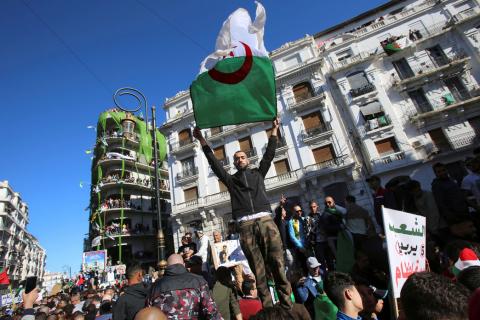Advertisement
Algerian doctors call for protests against Bouteflika
ALGIERS (Reuters) - Algeria's doctors have called for mass protests against Abdulaziz Bouteflika during the country's independence day celebrations on Tuesday, ratcheting up pressure on the ailing president who is clinging to power.
In a statement released on Monday, the independent Collective of Algerian Medical Residents (CAMRA) urged medical students to take part and denounce the "ruling gangs".
Algerians are desperate for new leaders to replace Bouteflika and other veterans of the 1954-1962 war of independence against France who dominate the country.
The president, in power for 20 years, announced last week that he was reversing a decision to stand for a fifth term, but stopped short of standing down. He has postponed elections and promised to adopt a new constitution under a reform plan.
The changes have brought no halt to demonstrations under way for more than three weeks against a ruling elite viewed as out of touch with a population suffering from economic hardship and corruption. Bouteflika, 82, has rarely been seen in public since a stroke in 2013, and protesters say he is unfit to rule.
Since returning from medical treatment in Switzerland last week, the president has been losing allies, including senior members of the ruling National Liberation Front party, known by its French acronym FLN.
In the latest blow to the ruling elite, leaders of 13 independent Algerian labour unions refused to support Prime Minister Noureddine Bedoui's efforts to form a cabinet.
"We will not hold discussions with this system, we belong to the people and the people said 'No' to the system," Boualem Amora, a leader of an education union, told reporters.
The prime minister planned to announce a new cabinet early this week.
Newly-appointed Deputy Prime Minister Ramtane Lamamra is expected to start a tour on Tuesday of some of Algeria's main allies abroad to explain the new political roadmap, said a foreign ministry official. The tour will start on Tuesday with a visit to Moscow, Algeria's most important military ally.
It will also include EU countries and China, which has invested billions of dollars in Algeria, pouring cash into housing and public works projects.
Protests have been mostly peaceful and the military, which is expected to keep playing its influential behind-the-scenes role as a power broker, has stayed in its barracks.
(Writing by Michael Georgy; Editing by Catherine Evans and David Holmes)



















Add new comment